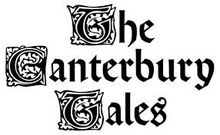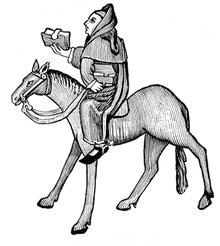
http://mhwalker2.hubpages.com/hub/A-Response-to-The-Canterbury-Tales
The Clerk[]

Background[]
The Clerk is somebody that doesn't necessarily work, he goes to school and is a student in philosophy. He is very wise and full of moral virtue. The Clerk had a pretty good standing in his social life. Although, he was very anti-social, he was really good. The importance for being a clerk during this time was because it was a very Religious part of time. There were many things that the clerk could do in the Middle Ages. He could have also been the Town Clerk. The Clerks day to day life was very boring. He went to school, came home and studied. Being a Clergyman isn't a boring part of his life for sure. Chaucer didn't include that the clerk was one of the clerks who did all of the accounts. The only reason he did that is because he was the only one that knew how to read and write. The modern day occupation that might correspond to the Clerk is an accountant because an accountant is somebody that deals with accounts.
Examination of Text[]
The Clerk is a very scrawny student of philosophy of Oxford. The Clerk is one of the most important people of the town. The world doesn't really pay attention to the scrawny looking people. The man of Law has used the Clerk to make more money.
Lines 3-11 of the prologue best describe my character's physical appearance.
As leane was his horse as is a rake,
And he was not right fat, I undertake,
But looked hollow and thereto soberly.
Full threadbare was his overest courtepy,
For he had gotten him yet no benefice
Nor was so worldly for to have office,
For him was lever have at his bed's head
Twenty bookes clad in black or red
Of Aristotle and his philosophy
Lines 17-24 of the prologue best describe The Clerk's personality.
And busily gan for the soules pray
Of them that gave him wherewith to scholay.
Of study took he most care and most heed.
Not one word spoke he more than was need,
And that was spoke in form and reverence
And short and quick and full of high sentence.
Sounding in moral virtue was his speech,
And gladly would he learn and gladly teach.
The specific words that add to my understanding of The Clerk's personality are scholar, and philosopher because a clerk can also be called a clergyman. The first spelling variation that I saw was Oxenford in middle English is Oxford in modern English. The second spelling variation that caught my eye was overest which is outer. Courtepy is/was a cloak. Hent was get. High sentence is described as a lofty sentence. To me that means that a thought is really long it sounds like that saying. The different spellings from middle English all seem a lot different and are a lot different.
Analysis of Passage[]
People think that The Clerk is Chaucer himself. Chaucer really likes the Clerk because of how quiet the Clerk actually was and how much he knew and wanted to learn.
Lines 300-310
On bookès and on learning he it spent,
And busily gan for the soulès pray
Of them that gave him wherewith to scholay.
Of study took he most care and most heed.
Not one word spoke he morè than was need,
And that was spoke in form and reverence,
And short and quick and full of high senténce.
Sounding in moral virtue was his speech,
And gladly would he learn and gladly teach.
The word choices that require an understanding of vocabulary from the time period are: Bologna: Principal Cultural Center. Y-go:gone. Oxenford:Oxford
References[]
Works Cited
"Canterbury." SparkNotes. SparkNotes, n.d. Web. 1 Oct. 2014. <http://www.sparknotes.com/lit/canterbury/section2.rhtml>.
"Canterbury Tales." SparkNotes. SparkNotes, n.d. Web. 30 Sept. 2014. <http://www.sparknotes.com/lit/canterbury/characters.html>.
"CliffsNotes Study Guides | Book Summaries, Test Preparation & Homework Help | Written by Teachers." CliffsNotes Study Guides | Book Summaries, Test Preparation & Homework Help | Written by Teachers. N.p., n.d. Web. 1 Oct. 2014. <http://www.cliffnotes.com/literature/c/the-canterbury-tales/summary-and-analysis/the-clerks-prologue-and-tale>.
"Description of the Clerk in the Prologue to the Canterbury Tales - Geoffrey Chaucer." Description of the Clerk in the Prologue to the Canterbury Tales - Geoffrey Chaucer. N.p., n.d. Web. 1 Oct. 2014. <http://www.interlinear.info/clerk.htm>.
"Geoffrey Chaucer (1342-1400) - "The Canterbury Tales", from General Prologue, ll. 287-310." Geoffrey Chaucer (1342-1400) - "The Canterbury Tales", from General Prologue, ll. 287-310. N.p., n.d. Web. 1 Oct. 2014. <http://www.librarius.com/canttran/genpro/genpro287-310.htm>.
"Medieval Occupations." Medieval Occupations. N.p., n.d. Web. 30 Sept. 2014. <http://www.ancientfortresses.org/medieval-occupations.htm>.
Shmoop Editorial Team. "The Clerk in The Canterbury Tales: General Prologue & Frame Story." Shmoop.com. Shmoop University, Inc., 11 Nov. 2008. Web. 1 Oct. 2014. <http://www.shmoop.com/canterbury-tales-prologue/clerk.html>.
http://academic.brooklyn.cuny.edu/webcore/murphy/canterbury/10clerk.pdf
MLA formatting by BibMe.org.